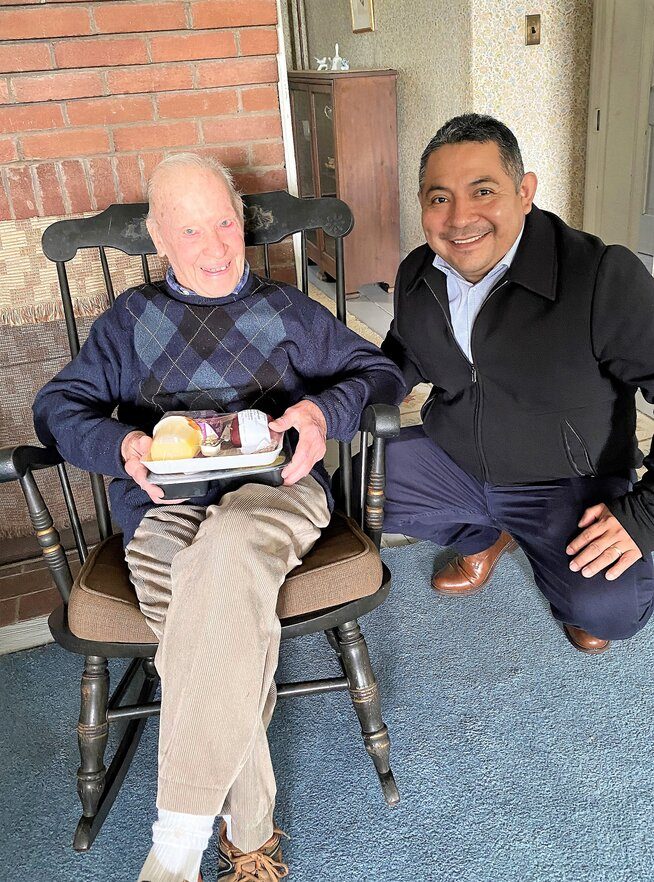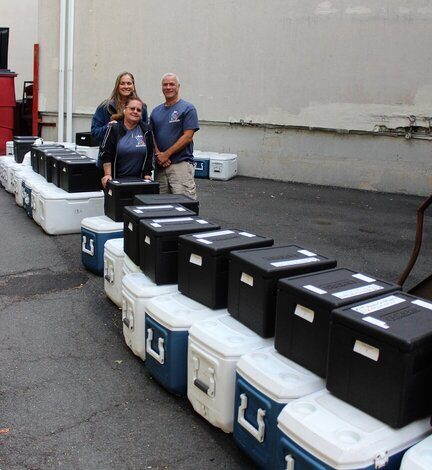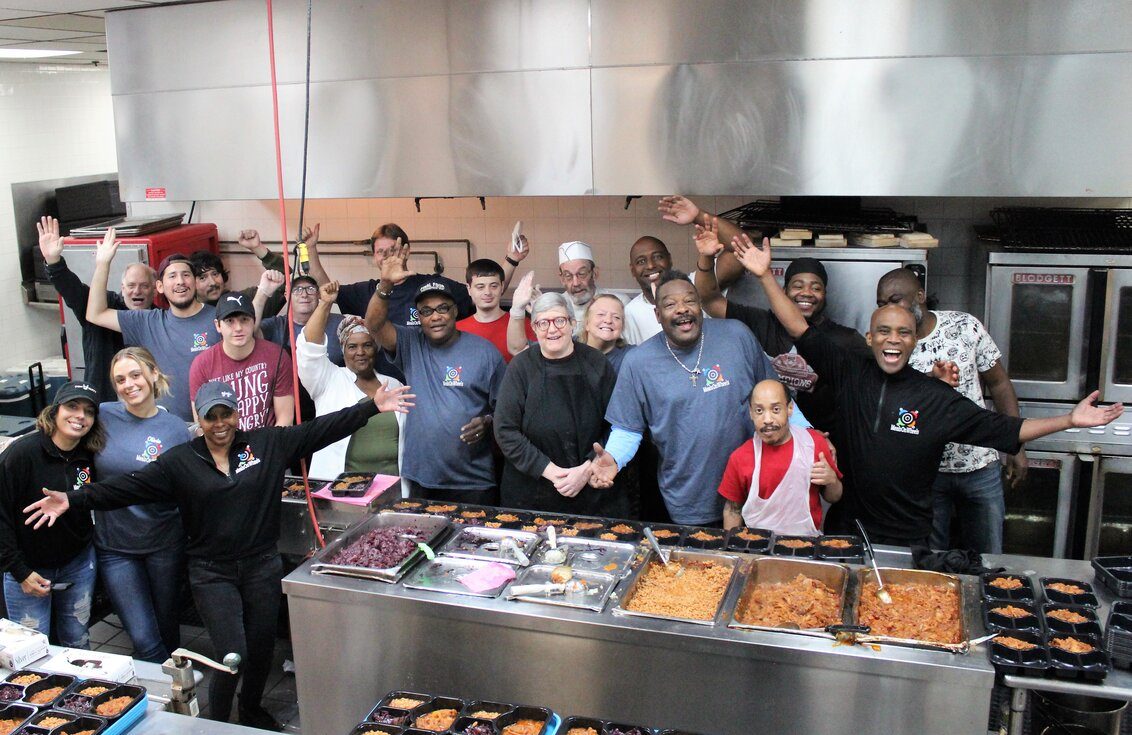For almost 50 years Meals on Wheels Rockland has improved the quality of life for aging Rockland County residents. Stop & Shop has supported this nonprofit through the Bloomin’ 4 Good and Community Bag Programs.
Tell us about Meals on Wheels Rockland.
Meals on Wheels of Rockland was founded in 1974, so we are coming up on our 50th anniversary next year. Shelly Berger from the Rockland National Council of Jewish Women saw a need in the community; she called up a couple of friends and started making and delivering meals. She started Meals on Wheels Rockland in her basement. Now, we’re close to delivering our 12 millionth meal!
Our mission is to enhance the wellness of Rockland’s older adults and their families by providing services that support their safety, independence and health.
What services do you provide to the community?
Meals on Wheels Rockland provides medically tailored meals made hot and fresh daily in our kitchen, Monday through Friday. Our meals are physician prescribed; we work with the meal recipient’s physician to ensure we are serving the best meals possible.
We know food is nutrition, and nutrition is medicine. From there, we deliver the diet type that will be the most beneficial. We have different meal types. Our house diet is geared towards diabetic, low-sodium, low-carb dietary needs; we also have the ability to provide Kosher, renal, vegetarian and vegan meals. We puree food, we have soft food, and we can cut people’s food for them.
We know food is nutrition, and nutrition is medicine.
We deliver to 800 people a day. Some people get one meal a day, which is our traditional hot meal, and then some people get a cold platter for a second meal. That way, they could put the cold platter in the refrigerator and eat that later on for dinner. It is incredible to see our kitchen in operation! A team of staff and volunteers rise early in the morning to prepare the meals. When the last meal is delivered, we realize, wow, we just fed a lot of people!
Making the meal is just our first course. Equally important, sometimes more important, is that knock on the door. Every day that volunteer knock brings a safety check. Our volunteers are trained to look for changes in condition or something that doesn’t feel right to them. If that happens, they report it back to our casework team.

Our casework team, at that point, reaches out to the seniors themselves, or they reach out to family members. We have family members that live all over the country, so they know that we’re knocking on the door and seeing and have our eyes on their loved ones. And they know we will contact them if something is not right. We have found people on the floor, some people in very bad situations, but some people, if we weren’t there, their situation would’ve been worse.
During the pandemic, we did not change our operations. We still produced a hot meal every single day. We actually added on to our operation. We started a telephone reassurance program, which is still going strong today. We knew food insecurity was an issue, so we delivered groceries to seniors, some weeks up to 5,000 bags of groceries. Before the pandemic, we were delivering to 400 people a day. Then in a matter of weeks, we were delivering to 1,200 people a day. We have wonderful volunteers that helped us with that.
What sets you apart from other nonprofits in your community?
When it comes to other nonprofits that address food insecurity, what sets us apart are the safety and wellness checks. Food insecurity is growing, and we know it will grow further, especially with SNAP benefits cut this year.
When it comes to other nonprofits that address food insecurity, what sets us apart are the safety and wellness checks.
Along with that safety check comes many friendly conversations. Our 600 volunteers are phenomenal. They make lifelong connections with the people that they deliver to. That safety check and those friendly conversations are just as important as receiving the food.
One of our volunteers, who has been with us for almost 20 years, was delivering meals to a woman who was moving. He and his wife delivered her last meal together and brought flowers to her to mark the occasion. His wife made a connection with the client’s daughter, and now they travel all over the country together.
During the pandemic, we started a telephone reassurance program where we connected volunteers who would call seniors for a friendly chat. Recently, we received a letter from the daughter of one of our clients. She told us how she visited her father one day during the pandemic, found him talking on the phone and laughing, and wondered who he was talking to. He said it was his Meals on Wheels volunteers and that he received two phone calls a week, one from another senior and one from a teenager. Seeing her father engaged in conversation and laughing was such a gift for his daughter.
If we didn’t know before, COVID taught us how important human connection is.
Tell us a story that illustrates the good work of your organization.
Let me tell you a story about Ingrid. She used to work on Wall Street, and her husband passed years ago. She never had any children and did not have family in the area, so she started receiving Meals on Wheels deliveries. Her body wasn’t working so well, but her brain was sharp as a tack.
Ingrid became everybody’s favorite among the volunteers. One volunteer, a businesswoman, left work when she delivered and always wore high heels. She always looked very stylish. So Ingrid had an automatic connection with her, and they always talked about fashion.
Ingrid asked the volunteer if she could get her a Macy’s catalog. Now, when is the last you’ve seen a catalog like that? But this volunteer contacted Macy’s and was able to get a catalog for Ingrid.
Stories like this happen all the time around here!
What is your most outstanding achievement or contribution to the community?
It’s staggering when you consider how many people we’ve delivered to and how we can keep them at home and independent. We’ve almost reached 12 million meals delivered, which is incredible for our small little county.

Recently, we had an emergency meal program with the local hospital here. The hospital found some people had frequent re-hospitalizations; they were re-admitted over and over. So, we did a pilot program and delivered meals to this group of people when they were discharged from the hospital. The results were incredible! In the first 30 days, 70% of the people did not return to the hospital. Ninety days after that, none of these people, 100%, did not go back into the hospital. It made a staggering difference for them to get the nutrition they needed and for somebody checking in on them with a smile and conversation.
What do you want people to know about your organization?
I want them to be aware of our impact on the community, not only for seniors with their health, nutrition and wellness but also with our volunteers. Our volunteers are engaged and have a sense of purpose as well. They range in age from 93 to a one-month-old baby who delivers with her mom. Volunteers are the heart of the community, and we serve the community.
How are you using the funds raised from the Stop & Shop Bloomin’ 4 Good Program?
All the funds go right back into all of our programming. It will help with seniors on a waitlist. It will help with the telephone reassurance program, where we don’t receive any funding.
Is there anything you’d like to add?
Yes, I didn’t discuss our senior activity centers! We have three of them open, with door-to-door transportation provided for those who do not want to drive.
The senior centers have education, exercise, activities, entertainment and field trips, anywhere from the Dollar Store to the winery to the casino. And they still get their hot meal plus time with their friends!

Published March 6, 2023.
